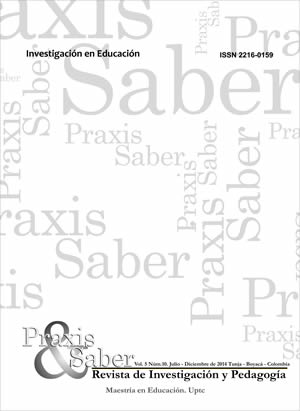Validación del instrumento ‘inventario de habilidades metacognitivas (Mai)’ con estudiantes colombianos

Resumen
El objetivo de este estudio fue adaptar y validar el instrumento denominado ‘Metacognitive Awareness Inventory’, para su uso con la población colombiana. Este instrumento fue creado por Schraw &, Denninson en 1994 para identificar habilidades metacognitivas en los sujetos y es conocido como MAI por sus siglas en inglés. El cuestionario tiene 52 ítems distribuidos en ocho categorías diferentes: conocimiento declarativo, conocimiento procedimental, conocimiento condicional, planificación, organización, monitoreo, depuración y evaluación. Fue aplicado a una muestra de 536 estudiantes de grados décimo y undécimo de instituciones educativas públicas y privadas en la ciudad de Bogotá a través de un aplicativo computacional desarrollado para el estudio. La información se recolectó por medio de la web y los datos fueron analizados con ayuda del SPSS. El alfa de Cronbach del instrumento fue de 0,94 y los de las ocho categorías oscilaron entre 0,61 y 0,71. Los resultados permiten concluir que la versión colombiana del MAI es un instrumento válido y confiable y que puede ser utilizado en futuras investigaciones con el objetivo de conocer sobre la conciencia metacognitiva de los estudiantes.
Palabras clave
metacognición, Inventario de Habilidades Metacognitivas, validación.
Citas
- AKIN, A.; ABACI, R. & CETIN, B. (2007). 'The Validity and Reliability of the Turkish Version of the Metacognitive Awareness Inventory'. Educational Sciences: Theory & Practice [7, 2, 671-678].
- ALCI, B. & KARATAS, H. (2011). 'Teacher candidates' metacognitive awareness according to their domains and sex'. International Journal of Multidisciplinary Thought [1, 6, 255-263].
- BALCIKANLI, C. (2011). 'Metacognitive Awareness Inventory for Teachers (MAIT)'. Journal of Research in Educational Psychology [9, 3, 1309-1332].
- BROWN, A. (1987). 'Metacognition, executive control, self-regulation and other mysterious mechanisms'. KLUWE W., R. H. (Ed.) Metacognition, motivation and understandin [65-116].
- CAMPO, A. & OVIEDO, H. (2008). 'Propiedades psicométricas de una escala: la consistencia interna. Revista de salud pública [10, 5, 831-839].
- CERVANTES, V. (2005). 'Interpretaciones del coeficiente alpha de Cronbach'. Avances en medición [3, 9-28[.
- CORTINA, J. (1993). 'What is Coefficient alpha?' Journal of Applied Psychology [78, 1, 98-104].
- DOGANAY, A. & DEMIR, O. (2011). 'Comparison of the Level of Using Metacognitive Strategies during Study between High Achieving and LowAchieving Prospective Teachers'. Educationat Sciences: Theory & Practice [11, 4, 2036-2043].
- FLAVELL, J. (1976). Metacognitive Aspects of Problem Solving: The Nature of Intelligence. Hillsdale: N. J. Erlbaum.
- FLAVELL, J. (1979). 'Metacognition and cognitive monitoring- A new area of cognitive–developmental inquiry'. American Psicology [34, 906-911].
- https://doi.org/10.1037/0003-066x.34.10.906
- GULA, F. & SHEHZADB, S. (2012). 'Relationship between metacognition, goal orientation and academic achievement'. Procedia - Social and Behavioral Sciences [47, 1864-1868].
- https://doi.org/10.1016/j.sbspro.2012.06.914
- JARAMILLO, S. & OSSES, S. (2012). 'Validación de un instrumento sobre metacognición para estudiantes de segundo ciclo de educación general básica'. Estudios Pedagógicos [XXXVIII, 2, 117-131].
- https://doi.org/10.4067/S0718-07052012000200008
- JUSI, H.; DENISE, D. & LEONAR, R. (2006). 'Perceived Third-Person Effects and Consumer Attitudes on Prevetting and Banning DTC Advertis'. The Journal of Consumer Affairs [40, 1, 90-116].
- KAPLAN, R. & SACCUZZO, D. (2005). Psychological testing: Principles, applications and issues. Wadsworth: Thomson.
- KLIMENKO, O. & ALVAREZ, J. (2009). 'Aprender cómo aprendo: la enseñanza de estrategias metacognitivas'. Educación y Educadores [12, 2, 11-28].
- MAGNO, C. (2010). 'The role of metacognitive skills in developing critical thinking'. Metacognition Learning [5, 137-156].
- https://doi.org/10.1007/s11409-010-9054-4
- MORALES, P. (2007). Estadística Aplicada a las Ciencias Sociales, La fiabilidad de los tests y escalas. Madrid: Universidad Pontificia Comillas.
- NARANG, D. & SAINI, S. (2013). 'Metacognition and Academic Performance of Rural Adolescents'. Studies on Home and Community Science [7, 3, 167-175].
- Nunnally, J. (1987). Teoría psicométrica. México: Trillas.
- OVIEDO, H. & CAMPO, A. (2005). 'Aproximación al uso del coeficiente alfa de alfa de Cronbach'. Revista Colombiana de Psiquiatría [XXXIV, 4, 2005].
- OZSOY, G. (2011). 'An investigation of the relationship between metacognition and mathematics achievement'. Asia Pacific Educ. Rev. [912, 227-235].
- PARIS, S.; Cross, D. & Lipson, M. (1984). 'Informed Strategies for Learning: A Program to Improve Children's Reading Awareness and Comprehension'. Journal of Educational Psychology [76, 6, 1239-1252].
- https://doi.org/10.1037/0022-0663.76.6.1239
- RAHMAN, F.; JUMANI, N. ; SATTI, M. & MALIK, M. (2010). 'Do metacognitively aware teachers make any difference in students' metacogniton?' International journal of academic research [2, 6, 219-224].
- ROCES, C.; TOURÓN, J. & GONZÁLEZ, M. C. (1995a). 'Motivación, estrategias de aprendizaje y rendimiento de los alumnos universitarios'. Bordón [47, 1, 107-120].
- SCHRAW, G. & DENNISON, R. (1994). 'Assessing metacognitive awareness'. Contemporary Educational Psychology [19, 460-475].
- https://doi.org/10.1006/ceps.1994.1033
- SCHRAW, G. & MOSHMAN, D. (1995). 'Metacognitive Theories'. Educational Psychology [7, 351-371].
- https://doi.org/10.1007/bf02212307
- SEZGIN, D. (2013). 'A comparison of metacognitive awareness levels of future elementary teachers in Turkey and USA'. Educational Research and Reviews [8, 6, 277-288].
- SPERLING, R.; HOWARD, B.; MILLER L. & MURPHY, C. (2002). 'Measures of Children's Knowledge and Regulation of Cognition'. Contemporary Educational Psychology [27, 51–79].
- https://doi.org/10.1006/ceps.2001.1091
- STEWART, P.; COOPER, S. & MOULDING, L. (2007). 'Metacognitive Development in Professional Educators'. The Researcher [21, 1, 32-40].
- STREINER, D. (2003). 'Being Inconsistent About Consistency: When Coefficient Alphas Does and Doesn't Matter'. Journal of personality assessment [80, 3, 217-222].
- https://doi.org/10.1207/S15327752JPA8003_01
- TULVING, E. & MADIGAN, S. (1970). 'Memory and verbal learning'. Annual Review of Psycology [21, 438-476].
- https://doi.org/10.1146/annurev.ps.21.020170.002253
- ULAS, H.; KOLAÇ, E. & SEVIM, O. (2011). 'Metacognition awareness levels of turkish teacher candidates'. e-Journal of New World Sciences Academy [6, 1, 121-134].
- YOUNG, A. & FRY, J. (2008). 'Metacognitive awareness and academic achievement in college students'. Journal of the Scholarship of Teaching and Learning [8, 2, 1-10].